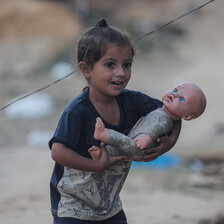The Electronic Intifada 29 November 2024

Two children pose in a specially made frame for World Children’s Day.
On 20 November, I decided to organize a special day for the 35 5-year-olds I teach in a kindergarten near me in Khan Younis.
It was World Children’s Day, and I figured that even if the world has forgotten Gaza’s children, we have not.
It’s not an official kindergarten, of course. Israel’s genocidal aggression on Gaza has seen 95 percent of Gaza’s schools destroyed or damaged, with at least 87 percent needing “significant reconstruction,” according to the UN, before they can be used again.
No, our “kindergarten” is a room in a house that was once a home – my grandmother’s home to be exact. It has not escaped damage. Wood and zinc sheets have replaced walls to give shelter from the weather, but the structure is still sound and my grandmother’s relatives still live on the second floor.
We welcome children from the area only. Parents remain fearful of anything resembling a long journey, so we take who we can from nearby.
In this, our imperfect haven, we try to keep a sense of education going for these young children and to provide care for their psychological well-being.
All of these kids suffer some trauma or other. One has lost both her parents. Another, Yousef, has a father who had to have both legs amputated after being injured in a bombing. All of them have lost loved ones. Twenty of them have been displaced from their homes elsewhere in Gaza and are now living in tents.
I wanted to make that Wednesday special for the kids. Some of them hadn’t eaten properly in weeks, and while I would not be serving them hamburgers or shawarma, at least I could try to make something fresh.
Gathering food was a challenge. It always is. Like everywhere else in Gaza, Khan Younis is suffering near-famine conditions as a result of Israel blocking access for humanitarian aid into Gaza.
The UN reported that Israel last month had on average allowed just 6 percent of the number of trucks with humanitarian aid, including food, to cross into Gaza that it allowed before last October.
So I had to make my way to the eastern borders of Khan Younis where there is a shop from which I could buy some canned foods, sugar and flour. I paid from my personal savings, money I had set aside over years of hard work.
I prepared simple treats, thyme pastries, savory meat pies and some cheese pastries, and my brother arranged with a nearby baker to have them freshly baked at 8 am so the children could savor them warm when they came.
I also made some sweets and gave them to the children as little gifts. I had tried to find toys for them, but none were available in local markets that barely carry basic food supplies, let alone anything non-essential.
A lovely day
It was a lovely day.
I woke up early to prepare the classroom. I hung colorful drawings, posters about children’s rights and a map of Palestine on the classroom wall.
I set up supplies on the tables, played uplifting music and created a special corner with a decorated wooden frame in which the kids could be photographed.
As they arrived, I greeted them one by one with a smile and a hug. Their laughter boomed around the room when they discovered the treats, the pastries and the festive decorations.
Each had their own reactions. Ahmed said it was like “we have a celebration today.”
Marah’s eyes widened when she saw the treats: “Are these sweets for us?”
Aysal also spoke up, but her voice was tinged with fear as she urged her friends not to be too loud.
“Maybe Israel will bomb us,” she said, trying to hush her friends. “Don’t raise your voices, or the planes might hear us and bomb our class.”
For hours, we shared stories and laughter. Each child took turns distributing the meals, their faces lighting up with delight as they shared with their classmates. I also handed out gifts, adding to the festive spirit.
We sat together, joking and playing, capturing countless beautiful moments that will forever be etched in my heart. My students are young souls who deserve nothing but joy; they should not have to bear the weight of war on their innocent hearts.

Rare treats for children who have not eaten properly in months.
20 November ought to stand as a poignant reminder of our collective commitment to children. It marks the day in 1959 when the UN’s General Assembly adopted the Declaration of the Rights of the Child, which was followed by the Convention on the Rights of the Child in 1989.
But in the context of a genocide, marking World Children’s Day by teaching Gaza’s children about rights they are being denied every minute almost seems like a cruel joke.
Israel has killed at least 14,000 children over the past 14 months. More than 20,000 are missing, lost, disappeared, detained or buried under rubble and more than 17,000 children are estimated to be unaccompanied, either orphaned or separated from their closest family.
More than 625,000 school age children have entered a second year without an education meanwhile, and among the 1.9 million people in Gaza – out of a 2.3 million population – who have been forcibly displaced, half are children.
Everyone is starving and no one is safe.
Like Aysal, no one feels safe.
Still, I taught my children about 20 November and their rights and we celebrated the day together.
I refuse to relinquish the hope that one day they too will experience the joys of freedom, safety, education, shelter, food, medicine and the right to express themselves and travel, just like other children.
Lubna Ahmad Abu Sitta is a teacher and content writer from Gaza.





